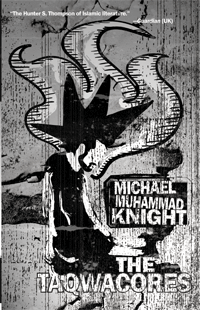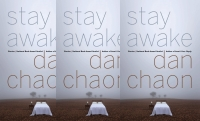Reviewed by Ben Stein, January 1 2010
The Taqwacores, by Michael Muhammad Knight
Michael Muhammad Knight may be the dark horse candidate for Literary Success Story of the Year. In 2009, Soft Skull Press published five of his books; I’ll review each of these in the coming weeks. Soft Skull began this project with a rerelease of 2004’s The Taqwacores, a novel that has become the foundational text for a Muslim punk movement of the same name. EyeSteelFilm has just released a documentary about this movement, in which Knight is featured prominently. The novel was released in January, followed in April by the memoir Impossible Man; in May by the road memoir Blue Eyed Devil; in July by another novel, Osama Van Halen; and, finally, just this month by the international pilgrimage memoir Journey to the End of Islam.
The Taqwacores tells the story of a group of Muslim punks in Buffalo, NY, through the eyes of narrator Yusef Ali. (This choice of a name might be taken as a nod to Muslim scholar Abdullah Yusef Ali, whose translation of the Qu’ran into English is widely-used, and referenced in some of Knight’s other work.) Yusef operates as a participant-observer, an ethnographer of this culture who is constantly evaluating himself in relation to it and vice versa. Throughout, the narrator and others discuss their developing understanding of punk and of Islam, trying to rationalize the two with their own actions. In these moments, Knight is engaged in a kind of practical moral philosophy, using his characters to give voice and body to questions about whether and where there is a place in a faith that is not merely a religion but a system of being in the world for what is classically an atheist/anarchist value system; how Islam’s prohibitions against alcohol, drugs, and unsanctioned sex square with certain elements of the punk scene that embrace these vices, and with those elements that embrace the prohibitions (chapter 2 features a brief discussion of the straight-edge worldview and some adherents’ “fard” against eating meat); how both Islam and punk frame women in ways that are at best ambiguous, and at worst deeply misogynistic. It is a compelling project, and Knight does well to concern himself more with the questions than the answers.
He does a fine job of using simple literary devices to concretize the ongoing conversation, employing for instance overt visual symbolism to map the contact zone between Islam and punk cultures: someone has smashed a hole in the living room wall to indicate the direction of Mecca, toward which at the start of the book a nameless Taqwacore prays, kneeling on a pizza box; the same living room is decorated with a Saudi flag (bearing the name of Allah) that has been spray painted with a circle-A; one character drives a “charismatically war-torn pickup truck with the tailgate covered by stickers of various bands and a green one reading ‘ISLAM is the way.’” These images are effective, if blunt.
What’s more subtle and more rewarding is Knight’s explorations of how language functions for these characters. For most, it is if nothing else a handy way of indicating belonging or otherness: Knight draws parallels between the secret argot-handshakes of various punk scenes (the names of bands, various “-cores”) and the Arabic that peppers the speech of American Muslims. For others, language serves to illustrate character elements, as here, where a hardline Sunni named Umar accosts another Muslim for having sex: “[Y]ou fucking little piece of Shi’a shit[…]That’s right, Shi’a-shit, fuckin Shi’it, yeah there you go, fuckin’ kafr.” The progression of this diatribe – from the juxtaposition of Shiite practice and excrement to the hyphenated linking of the two to a portmanteau that blends them – is subtly-constructed, and leaves only one greater insult: kafr, infidel. For Umar, the only thing worse than a mixture of feces and bastardized Islam is no Islam at all.
But the most important commentary on language per se comes very near the start of the novel, like a thesis. Yusef suggests that language fails in one crucial way – ironically because of its suppleness, its adaptability. It can’t clearly delineate what he needs it to: “Inevitably I reached the understanding that this word ‘punk’ does not mean anything tangible like ‘tree’ or ‘car.’ Rather, punk is like a flag; an open symbol, it only means what people believe it means.” Leaving aside the fact that theorists have, for decades, made the same claims about all language – including ’tree’ and ’car’ – this moment sets up a project that gets enacted in the events of the novel more effectively than it is in any of the ample dialog about the nature of “punk” and “Islam.” Knight’s narrative can be read as an inquiry into what happens to a community of individuals when each is living according to what they perceive as the dictates of two ostensibly conflicting “open symbol[s].” Thankfully, Knight doesn’t posit an answer – another nod to the insufficiencies of language. Instead, he ends the novel with a provocative scene that is, in spite of all its melodrama, a jarring allegory for the powder keg with which these characters have been toying.
To be frank, there are moments in The Taqwacores that make clear it is the work of a writer in the early stages of his maturity. During party scenes, the voice becomes derivative of Kerouac’s in On the Road or The Dharma Bums. There is painfully-rendered near-sex: “I approached her breasts almost violently, squeezing as hard as I could while my soft imbibes of her nipples gave way to hard tugs with the teeth.” (One could argue that the awkwardness of the voice is reflective of the narrator’s own sense of awkwardness in the scene he’s narrating. But that doesn’t excuse “imbibes of.”) The final paragraph opens with the line “So there you have it.” Still, the book is earnest, and it is attempting something exciting; I’m willing to weather a few poorly-wrought sentences if it means I get to experience some sincerity. And I should point out that the follow-up, Impossible Man (which I’ll review in the coming weeks) shows Knight hitting his writerly stride. In both books, Knight is open, vulnerable, and generous, making for books that leave you rooting for him, and eager to check back in.
–
Ben Stein is a Review Editor for Emprise Review
For further Reading
Soft Skull Press
The Taqwacores page
Michael Muhammad Knight Interview at Hip-Hop Linguistics
Taqwacore








